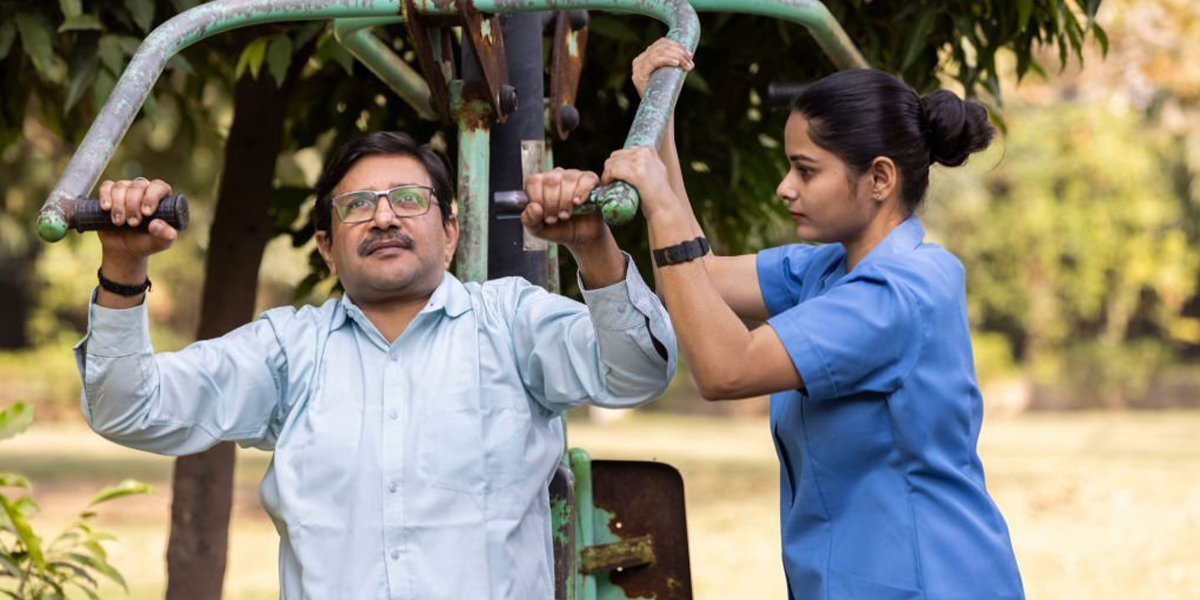Top 5 Rehabilitation Techniques to Reclaim Your Strength and Flexibility
Rehabilitation as defined by the World Health Organisation (WHO) refers to a set of interventions planned to optimise functioning and lower disability in individuals with health ailments. Engaging in rehabilitation techniques helps the individual to become independent as possible in executing their daily activities. It also helps them to participate effectively in work and recreation activities. Improvements in physical health also improve one’s mental wellness. Although there is an increase in the life expectancy of humans, people live longer with chronic health diseases. This in turn shoots up the need for rehabilitation centres and therapies.
The global need for rehabilitation is on the rise but stays unmet due to several reasons. Older adults can benefit greatly by administering the right rehabilitation procedures.
Strength and
Flexibility
are two vital factors affected by aging.
Older adults will need more strength to perform simple tasks like getting up
from a chair. Hence focusing on improving their strength and flexibility will
improve their capacity to perform such tasks.
Why
should Elders Improve Strength and Flexibility?
Regaining and improving strength in older
adults helps them to perform activities with less stress and reduces
dependence. Strength training enables the muscles to work against a force or
pressure, thereby augmenting their strength. In the elderly, strengthening the
muscles will improve their stability and balance. Stretching exercises improve
the elasticity of the muscles and promote flexibility. Good strength and flexibility benefit in many other ways like
➔
Reduced chronic pain
➔
Reduced risk of
injuries
➔
Reduced risk of
fractures
➔
Reduced falls
➔
Corrects posture
➔
Improved Functionality
➔
Boosts confidence and
positive mental health
5 Best
Rehabilitation Techniques To Rebounce Strength and Flexibility
Rehabilitation
for seniors
is instrumental in developing their
physical health. There are different strategies adopted to renounce strength and flexibility in the elderly.
Physiotherapy is a widely used rehabilitation therapy to improve physical strength in older adults. It involves different strategies like stretching, massaging, electric stimulation, and many more. Physiotherapists help in assessing the elder’s physical health status and design a plan to improve their status. Regaining muscle strength, coordination, balance, mobility, and functioning is the goal of physical therapy.
Manual
Physical Therapy
Manual therapy helps reduce pain, reduce limitations, and improve flexibility. Manual therapy is a technique administered by therapists that involves them providing hands-on service. Strengthening exercises, passive movements, massages, gait training, and balance exercises are a part of manual therapy. These exercises will help attenuate pain, relax the muscles, and promotes flexibility.
Thermotherapy
Applying heat as an intervention reduces pain in joints, and improves functionality It helps in modifying the blood flow and reduces inflammation and swelling. Heat poses are a valuable treatment method to increase muscle and ligament flexibility. Low-level heat therapy may help in alleviating pain and improves muscle flexibility and strength. It is an efficacious method to relieve joint stiffness in osteoarthritis, a traditional condition in the elderly.
Occupational
Therapy
Helping adults adapt to their physical changes and promote independence is the primary goal of occupational therapy. It helps them to stay active by performing a routine of exercises. Physical therapy exercises like medicine ball training, range of movement, squats, shoulder rolls, fine motor activities, and more are incorporated into occupational therapy that improves strength and flexibility.
Hydrotherapy
Also known as aquatic physiotherapy, it
refers to the use of water for treating physical ailments. The warmth of water
supports a full range of movement and relaxes the muscles. The healing
properties of water reduce the stiffness of joints and improve muscle strength,
endurance, and flexibility. Research has demonstrated that hydrotherapy
promotes quadriceps and shoulder strength and flexibility.
Exercises
Practiced in Rehab to Improve Strength & Flexibility
As part of the different rehabilitation
therapy, various exercises are also performed. Regular workout is an
accessible and least stressful technique to step up one’s level of strength and
flexibility. Some of the exercises that can be practiced are:
●
Walking:
The goals on distance or number of steps
vary based on the individual’s health condition.
●
Stretching
Joints: Shoulder stretching involves grabbing one
arm with the opposite hand against the chest and holding the position for a few
seconds. Repeat the same with the other hand. Stretching the neck from side to
side, up to down, and rotations can improve stiffness. Tricep stretches and hip
stretches can also be performed.
●
Overhead
side stretch: Raise one arm and bend sideways to the
opposite side and hold the position for a few seconds. Repeat the same with the
other arm.
●
Hamstring
stretch: Stretch one leg forward and bend while
keeping the leg straight. Do not strain too much while trying this. When trying
this on a chair, place another chair on the opposite side to place one leg on
it and bend forward.
● Chair Yoga: Overhead straight and side stretch, seated cat-cow stretch, seated mountain pose, seated side twists, seated forward bends, etc.
To
Sum Up
Increasing body movement is key to
maintaining strength and flexibility among the elderly population. Exercise
should be a part of the daily routine for senior citizens. It helps in speeding
up recovery, reducing pain, preventing falls, and improving gait, strength, and
flexibility. At Athulya Assisted Living,
our therapists incorporate diverse strategies to build strength and
flexibility among elders. Our team of therapists collaborates to craft a
personalized treatment plan to effectively improve the seniors’ physical health
status. To learn more, kindly visit our homepage, Athulya Assisted Living.




Comments
Post a Comment